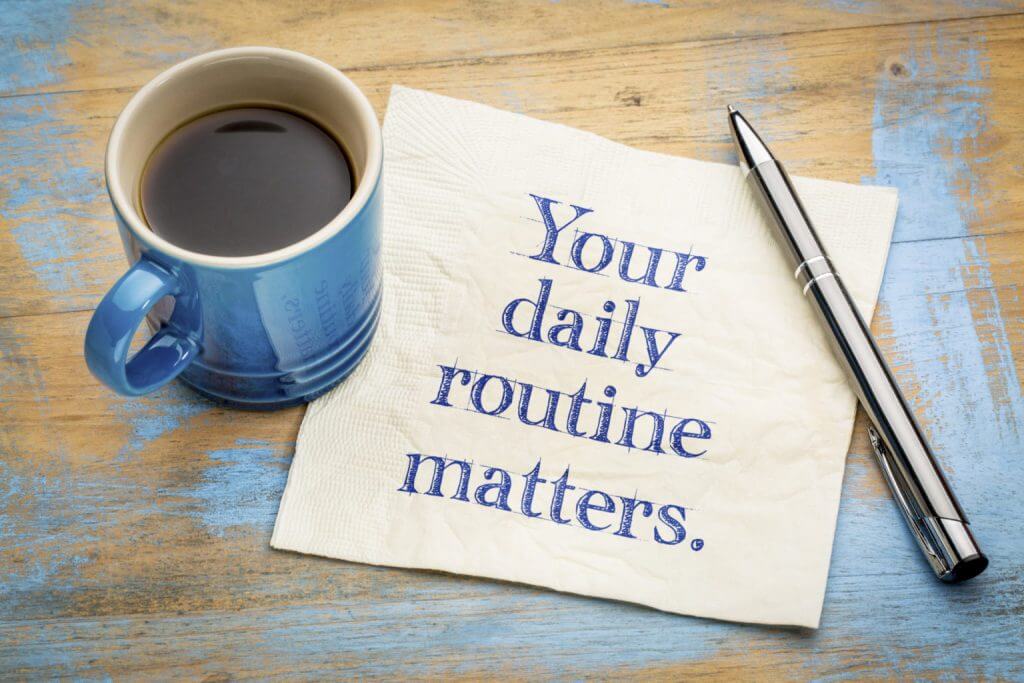by Jodi Cohen

| As you start to prepare for 2021, I wanted to share my favorite personal strategy for turning my new year’s resolutions into reality. It begins with daily routines, including my daily essential oils routine. |
| Routines have been a saving grace during the most challenging periods of my life. After my 12-year-old son Max was killed in a car accident, a friend advised that I focus on 3 simple things – Eat, Sleep and Move. Being prone to anxiety and overwhelm even on my good days, the eat-sleep-move paradigm added structure to my day and allowed me to create achievable goals and set clear routines. As shock subsided into grief, these routines became even more valuable in my healing. No matter what how anxious or grief stricken I felt on any given day, I could always fall back into the auto pilot of my daily routine and that alone often helped me feel better. What is a routine? A routine is a sequence of actions that you do regularly or at specified intervals. You might think of them as daily habits or rituals, like brushing your teeth or enjoying your morning cup of coffee. Routines can become automatic defaults, like remembering to take your supplements or exercise. They help give your day structure and help you feel like you have control over your life even in times of deep grief or uncertainty. Routines help you feel safe and calm, providing a reliable anchor in the storm even when our external environment feels uncertain and unpredictable. How do routines support health? Routines lay the groundwork for big changes in your health and your life. For example, when you improve your sleep, reduce your stress, increase your circulation and improve your ability to eliminate toxins, your health can vastly improve. If that sounds a bit overwhelming, don’t worry. The introduction of small routines, or Tiny Habits as my friend and colleague, Stanford University professor BJ Fogg calls them, can have a big impact on your health. Through his work as a Behavior Scientist, Fogg identified three key elements necessary to change behavior: Motivation to change Ability to change Prompt, or a trigger, to incite change. I find that essential oils or other sensory stimulation are the best triggers. Fogg further observed that is easier to shift behavior when are able to break down the desired behavior (or end health goal) into small, manageable, easy to achieve baby steps. Routines help you achieve these baby steps or small successes that can empower you to accomplish big things. The small repeated actions can have an exponential effect. How to Use Essential Oils as Prompts A prompt is an easy trigger or call to action that triggers your desired behavior. In order to change behavior, you have to prompt the behavior. Without a prompt, you can be very motivated and have the ability to perform the behavior, but there’s simply no call to action. Ideal prompts should be noticeable and actionable. This means you should be able to spot the prompt, ideally with one of your senses like your sense of sight or sense of smell, and you should know what to do when seeing the prompt. A traffic light is a common prompt. You visually recognize that you have to stop when the light turns red, and know you can drive when the light is green. Essential oils can be used as powerful behavioral prompts, for a number of reasons. Your brain responds to smell based stimuli like essential oils within seconds. In fact, research estimates your sense of smell to be 10,000 times more acute than your other senses. Once registered, scent stimuli travel more quickly to the brain than do either sight or sound. Scent has direct access to the emotional center of your brain that controls your hormones and motivation levels, known as you limbic system. On a physical level, only two synapses separate your amygdala from your olfactory nerve. No other sensory system has this kind of direct and intense contact with the neural substrates of your brain’s emotional control center. Your other four senses, including sound, sight, taste and touch must travel to other regions of the brain first, before reaching your limbic system. This makes essential oils an incredibly powerful prompt for triggering desired behavior. Fogg advises that you have to “put hot triggers in the path of motivated people”. Essential oils are my favorite hot trigger to prompt routine and behaviors. |
How Smell Stimulates Your Brain
Your brain’s response to scent stimulates the release of hormones and neurochemicals that alter your physiology and your emotional response. It is your hypothalamus that produces both excitatory hormones that stimulate brain activity, and inhibitory hormones that exhibit a more calming effect.
These brain hormones, in collaboration with your pituitary gland, control all hormonal messages for your endocrine, stress and digestive systems which, in turn, affect and protect every aspect of your health, including your emotional state. In fact, your sense of smell is so sensitive that virtually any odor will elicit brain response registering some clinically demonstrable physical or behavioral reaction.
It is this direct channel between smell and your hypothalamus by which essential oils help to combat stress and emotional trauma as well as stimulate the production of hormones.
This is the mechanism at play when you have an emotional response to an odor-evoked memory.
Balancing Your Hypothalamus with Essential Oils
Fortunately, essential oils can be used to support your hypothalamic and keep this important part of your brain healthy.
Hypothalamus™ blend contains a proprietary blend of organic essential oils, including Patchouli and Frankincense, which are high in sesquiterpenes.
1 thought on “How I Turn New Year’s Resolutions into manageable daily routines”